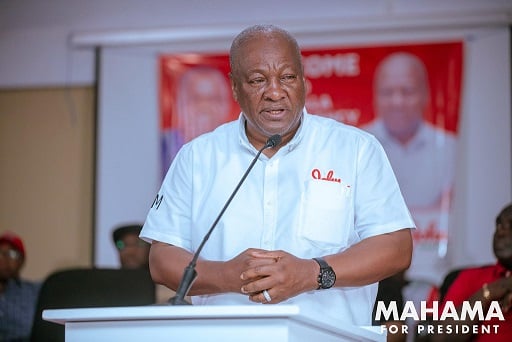Former President John Dramani Mahama, who is running as the presidential candidate for the National Democratic Congress (NDC), has articulated a progressive vision for Ghana’s digital economy, emphasizing its pivotal role in future economic growth. He announced plans to elevate the Ghana Digital Centre, aiming to place the nation at the forefront of the global digital and gig economy. This initiative includes establishing digital innovation hubs to nurture young technology entrepreneurs and facilitating the development of “unicorns,” which are startups valued at over $1 billion. Moreover, Mahama proposed an annual robotics competition to foster innovation among youth, tracking competition winners and encouraging investor support to bring their ideas to fruition. To showcase local innovations, he also plans to host an annual digital marketplace festival specifically targeting youth-created innovations.
In alignment with this digital agenda, Mahama envisions the establishment of a National Employment Bureau aimed at constructing a comprehensive employment database that will assist in tracking unemployed youth. This initiative represents a fundamental aspect of the NDC’s broader youth development policies, which stress substantial investments in education, skills development, and the creation of a vibrant entrepreneurial ecosystem. Mahama emphasized the urgency of developing programs specifically designed to boost youth employment and to provide incentives for employers who engage individuals through the Youth Employment Agency (YEA). This strategic approach underlines his commitment to leveraging the capabilities of young Ghanaians as vital contributors to the nation’s growth and development.
As part of his youth-centric agenda, Mahama has identified the need for reforming the National Service Scheme to better align its objectives with national development priorities. The proposed reforms include a review of allowances for national service personnel and the passage of a legislative instrument to formally implement the National Service Authority Act of 2024. Additionally, he aims to create a structured National Orientation Programme designed as an onboarding tool to foster civil responsibilities and a sense of national identity among young people. Furthermore, to improve the transition from education to the workforce, Mahama proposes both mandatory and voluntary programs focused on the acquisition of practical work skills and tools, reflecting a commitment to real-world readiness.
Recognizing the challenges faced by Ghanaian youth today, Mahama has announced plans to create a Ministry of Youth Development, which will focus exclusively on mainstreaming and coordinating youth-related policies and initiatives across governance levels. This ministry is intended to promote youth-friendly local content policies in various sectors, including energy, mining, telecommunications, and manufacturing. By prioritizing youth development, his proposal includes establishing a strong framework for interagency partnerships aimed at addressing critical socio-economic issues such as unemployment, skills enhancement, education access, health services, entrepreneurial support, and substance abuse prevention.
Moreover, Mahama emphasized active youth participation in national decision-making processes through the full implementation of the National Youth Authority Act of 2016. This would involve enacting necessary legislative frameworks to facilitate the establishment of district and regional youth committees, as well as the Ghana Youth Federation. By doing so, he aims to empower the youth, allowing them active roles in political and social domains. In addition, he proposed developing youth work professionalization programs that would assist in equipping young people with the necessary skills to mobilize community development initiatives through volunteer brigades.
To catalyze job creation and foster entrepreneurship in a modern 24-hour economy, Mahama introduced the Youth Innovation and Industrial Parks (YIIP) initiative. This plan focuses on scaling small to medium enterprises driven by young innovators, tailored to support district-level economic growth. Additionally, he intends to create co-working spaces and one-stop business startup services at the district level. This would facilitate access to services from the Registrar General’s Department and aid in streamlining business registration and development processes for young entrepreneurs. Overall, Mahama’s vision emphasizes a collaborative approach, harnessing the potential of young Ghanaians within a supportive ecosystem that nurtures innovation, productivity, and sustainable economic growth.


